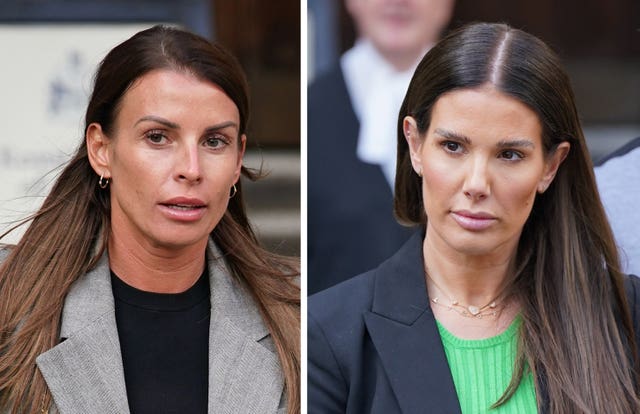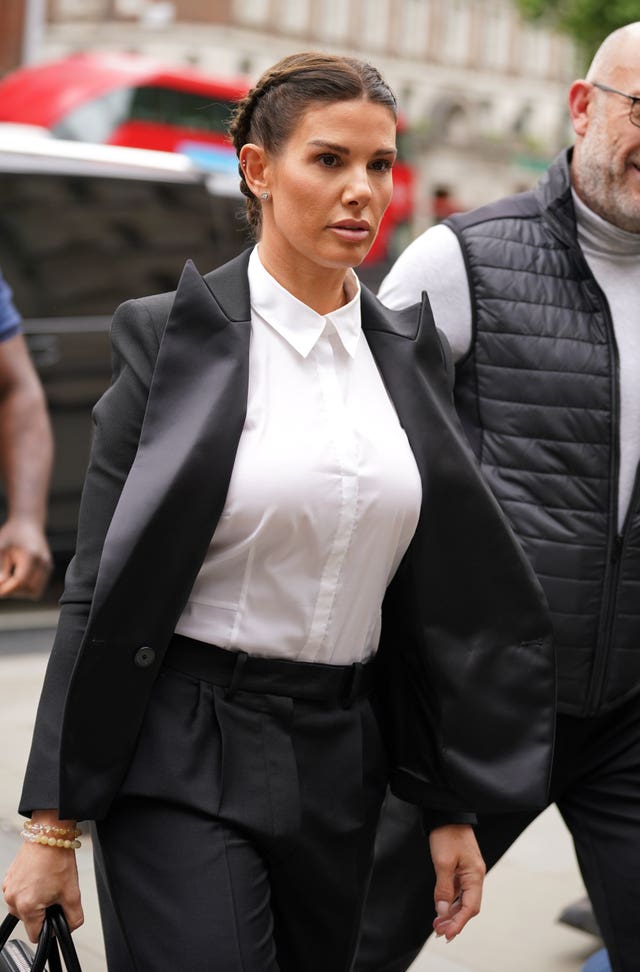Wagatha Christie battle appears to come to an end after latest costs ruling
The hearing on Tuesday came more than five years after the viral social media post at the heart of the libel dispute.

The Wagatha Christie libel battle between Rebekah Vardy and Coleen Rooney appeared to come to an end on Tuesday, more than five years since the viral social media post at the heart of the dispute.
Mrs Vardy sued Mrs Rooney at the High Court over alleged “very serious harm to her reputation” as a result of the latter’s October 2019 post, which claimed Mrs Vardy’s Instagram account was responsible for leaking information about her to The Sun newspaper.
After a seven-day trial, Mrs Justice Steyn ruled in Mrs Rooney’s favour in July 2022, finding it was “likely” that Mrs Vardy’s agent, Caroline Watt, had passed information to The Sun and that Mrs Vardy “knew of and condoned this behaviour” and had “actively” engaged.
The pair were then engaged in a battle over legal costs for almost three years, potentially culminating on Tuesday when a specialist costs court was told that Mrs Vardy had agreed to pay almost £1.2 million of Mrs Rooney’s legal costs, with a judge also ruling she must pay an additional £212,000.
The case began in October 2019, when Mrs Rooney publicly claimed Mrs Vardy’s account was the source behind three stories featuring fake details she had posted on her private Instagram profile – her travelling to Mexico for a “gender selection” procedure, her planning to return to TV, and the basement flooding at her home.
Mrs Rooney wrote: “I have saved and screenshotted all the original stories which clearly show just one person has viewed them.
“It’s …… Rebekah Vardy’s account.”
The case first went to court in November 2020, with a judge finding that Mrs Rooney’s post “clearly identified” Mrs Vardy as being “guilty of the serious and consistent breach of trust”.
On the first day of the trial at the Royal Courts of Justice in London in May 2022, Hugh Tomlinson KC, for Mrs Vardy, said the TV personality had to bring the libel claim to “vindicate her reputation”.
In written submissions, David Sherborne, for Mrs Rooney, said: “In short, the claimant is someone who has secretly provided, or sought to provide, to the press private information which she has been privy to in relation to a number of individuals in the footballing world or other celebrities, and not just the defendant, without their consent.”

Both women gave evidence in the trial, as well as Mrs Rooney’s husband, former England and Manchester United striker Wayne Rooney.
In July that year, Mrs Justice Steyn ruled it was “likely” that Mrs Vardy’s agent at the time, Ms Watt, “undertook the direct act” of passing the information to The Sun.
But she added: “Nonetheless, the evidence … clearly shows, in my view, that Mrs Vardy knew of and condoned this behaviour, actively engaging in it by directing Ms Watt to the private Instagram account, sending her screenshots of Mrs Rooney’s posts, drawing attention to items of potential interest to the press, and answering additional queries raised by the press via Ms Watt.”
In October that year, the same judge ruled that Mrs Vardy should pay 90% of Mrs Rooney’s costs, including an initial payment of £800,000.
At a hearing in October 2024, a specialist costs court was told Mrs Rooney’s legal bill totalled more than £1.8 million, although a previous court hearing had been told it was around £1.6 million.
Jamie Carpenter KC, for Mrs Vardy, criticised the size of the bill, claiming it had a “kitchen sink approach”.
He also said Mrs Rooney’s lawyers had committed “serious misconduct” by “deliberately understating” some of her costs, which meant Mrs Vardy should pay less.
Robin Dunne, for Mrs Rooney, said there had “been no misconduct” and that Mrs Vardy had shown “deplorable conduct” in the case.
Senior Costs Judge Andrew Gordon-Saker found that Mrs Rooney’s lawyers had not committed misconduct, and also ordered Mrs Vardy to pay a further £100,000 to Mrs Rooney.
Mrs Vardy then appealed against that finding, but High Court judge Mr Justice Cavanagh rejected the challenge in April.
The full assessment of the total amount Mrs Vardy was due to pay Mrs Rooney began on Tuesday, and was initially expected to last up to 10 days.
But, at the start of the hearing, the court was told the pair have agreed to settle the bill.

Barrister Juliet Wells told the hearing that Mrs Vardy has agreed to pay £1.19 million of Mrs Rooney’s legal bill, including VAT, which comprises around £1.12 million in costs and around £65,000 in interest.
But she said Mrs Rooney is also claiming £315,000 in “assessment costs” – the costs of assessing the full legal bill – which she said is “grossly disproportionate”.
Mr Dunne, again appearing for Mrs Rooney, said the figure “is higher than would have been the case had Mrs Vardy approached these costs proceedings reasonably”.
Costs Judge Mark Whalan ruled it was “reasonable and proportionate” for Mrs Vardy to pay £212,266.20 of Mrs Rooney’s assessment costs, inclusive of VAT but before interest, on top of the £1.19 million settlement, totalling at least £1,402,266.20.
Concluding the hearing, he said he was “generally happy” that the outcome was a “commercially satisfactory conclusion for both sides”, but that there had been “extraordinary expenditure of costs” by the parties.
He added: “I do mean it when I say that I hope that this is the end of a long and unhappy road.”




